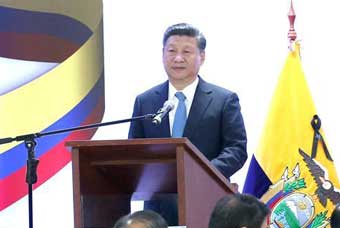by Mahmoud Fouly
CAIRO, Jan. 7 (Xinhua) -- Egypt's rising total foreign debt to exceed 60 billion U.S. dollars as of September 2016 requires massive production and minimized imports of dispensable commodities to boost economic ability to pay off, limit unemployment and make up for foreign currency shortage, said Egyptian economic experts.
Egypt has been suffering economic recession over the past few years of political instability and relevant security issues that led to the decline of tourism, foreign currency reserves and foreign investments.
It led the country to start a strict economic reform plan including austerity measures, energy subsidy cuts and local currency floatation encouraged by the International Monetary Fund (IMF), which handed Egypt in November 2.75 billion dollars as the first batch of a 12-billion-dollar loan to finance its reform program.
The Central Bank of Egypt (CBE) stated in a report earlier in January that Egypt's total foreign debt increased by about 4.4 billion dollars to hit 60.2 billion as of end of September 2016, compared to 55.8 billion in the end of June 2016 and 46.1 billion in the first quarter of last fiscal year 2015/2016. Egypt's fiscal year is from early July to end of June.
"To limit debts and revive economy, Egypt needs to encourage industry, resolve its obstacles, increase exports and minimize imports of any products that can be locally produced at least for a while," said Motasim Rashed, economic adviser of Egyptian Investors Union.
"There is no shame in borrowing, but it's inappropriate to lack enough production to pay off," Rashed told Xinhua, noting that President Abdel-Fattah al-Sisi instructed the government to avoid loans and resort to grants when necessary.
The expert argued that agriculture should focus on imported crops or their extracts, such as oil-producing plants, stressing that there must be integration between the country's agricultural and industrial policies.
For his part, Ehab al-Desouki, head of the Economy Department of Cairo-based Sadat Academy, sees that the rise of foreign debt is "alarming" and that the safety of borrowing depends on the ability of the country's economy to repay.
"Egypt's dollar resources to pay off are limited. The foreign currency resources, including tourism, exports, remittances of Egyptian expatriates and the Suez Canal revenues, are all declining, so the country should work hard on a leap in agricultural and industrial production as well as exports to contain the issue," the expert told Xinhua.
The total 60-billion-dollar foreign debt currently represents 16.3 percent of the country's gross domestic product (GDP), while the total domestic debt rose by end of September to reach 2.758 trillion Egyptian pounds (about 154.4 billion dollars).
"The 60-billion-dollar foreign debt is not alarming since it is about 16 percent of the GDP. Some economists believe it is on the safe side until it reaches 86 percent of the GDP," said Gamal Bayoumi, head of the Arab Investors Union and chief of Egypt-Europe Cabinet Unit.
He reminded that when an economic crisis in Egypt started in 1987 and peaked in 1991, the total foreign debt was 52 billion dollars, noting that Egypt then agreed with Paris Club to reschedule its debts and implemented an economic reform plan.
"The interest rates of Egypt's foreign debts do not exceed 2 billion per year, so Egypt can borrow within its capability of paying off," Bayoumi said.
Following the 2011 popular uprising that ousted former President Hosni Mubarak, Egypt's foreign currency reserves declined from 36 billion dollars to 13.5 in early 2013 until it gradually rose to 24.3 billion by end of December 2016 compared to 23.05 billion dollars in November 2016.
"It's a good indicator that things are getting better and the central bank is achieving its target of 25 billion dollars in foreign fund reserves," the chief Arab investor told Xinhua.














